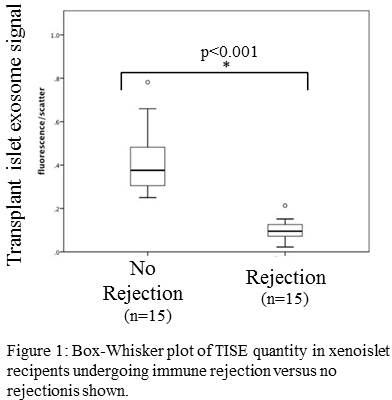Characterization of Human Islet Transplant Specific Exosomes in a Xenoislet Transplantation Model.
Department of Surgery, University of Pennsylvania, Philadelphia, PA.
Meeting: 2016 American Transplant Congress
Abstract number: 352
Session Information
Session Name: Concurrent Session: Pathways of Allograft Rejection: Animal Models
Session Type: Concurrent Session
Date: Monday, June 13, 2016
Session Time: 4:30pm-6:00pm
 Presentation Time: 5:42pm-5:54pm
Presentation Time: 5:42pm-5:54pm
Location: Room 310
Background: There is a critical need for biomarker platforms for monitoring transplant rejection. We propose that transplant tissues release donor specific exosomes into recipient blood/ bodily fluids, and changes in transplant exosome profiles would constitute a novel biomarker platform for monitoring rejection. We studied this concept in xenoislet transplant model.
Methods: Human islets were transplanted into diabetic, athymic mice and recipient plasma was analyzed for transplant islet specific exosomes (TISE) using anti-HLA antibody quantum dots on NanoSight nanoparticle detector. Rejection was induced by infusion of syngeneic leukocytes (n=15) and plasma TISE signal was characterized. TISE were purified using affinity antibody beads, and the exosome protein (Western blot, mass spectrometry) and RNA (RT-PCR, microarray) cargoes were profiled.
Results: TISE were reliably tracked in all normoglycemic recipient plasma samples (n=20 versus n=10 naive animals) over follow-up (14 to 96 days) (p<0.001). Immune rejection caused quantifiable decrease in recipient plasma TISE signal (p<0.001) [Figure 1]. Purified TISE cargo contained bona fide islet endocrine specific markers insulin, glucagon, and somatostatin at the protein and mRNA levels. Microarray showed distinct enrichment of microRNAs in TISE compared to human islet graft. Further, islet rejection led to decreased signal in TISE insulin levels. Proteomic profiles of TISE performed using mass spectroscopy showed distinct changes in proteins associated with immune rejection. Microarray analysis showed distinct changes in the microRNA profiles of TISE with transplant rejection.
Conclusions: Transplanted human islets release quantifiable islet specific exosomes into recipient plasma, and TISE quantity decreases with immune rejection. TISE characterization shows condition specific (immune rejection) changes in their proteomic and RNA cargoes. These findings validate the biomarker potential of transplant tissue specific exosome characterization in transplantation diagnostics.

CITATION INFORMATION: Vallabhajosyula P, Korutla L, Yu M, Rostami S, Yuan C.-X, Liu C, Korutla V, Reddy S, Habertheuer A, Naji A. Characterization of Human Islet Transplant Specific Exosomes in a Xenoislet Transplantation Model. Am J Transplant. 2016;16 (suppl 3).
To cite this abstract in AMA style:
Vallabhajosyula P, Korutla L, Yu M, Rostami S, Yuan C-X, Liu C, Korutla V, Reddy S, Habertheuer A, Naji A. Characterization of Human Islet Transplant Specific Exosomes in a Xenoislet Transplantation Model. [abstract]. Am J Transplant. 2016; 16 (suppl 3). https://atcmeetingabstracts.com/abstract/characterization-of-human-islet-transplant-specific-exosomes-in-a-xenoislet-transplantation-model/. Accessed February 26, 2026.« Back to 2016 American Transplant Congress
